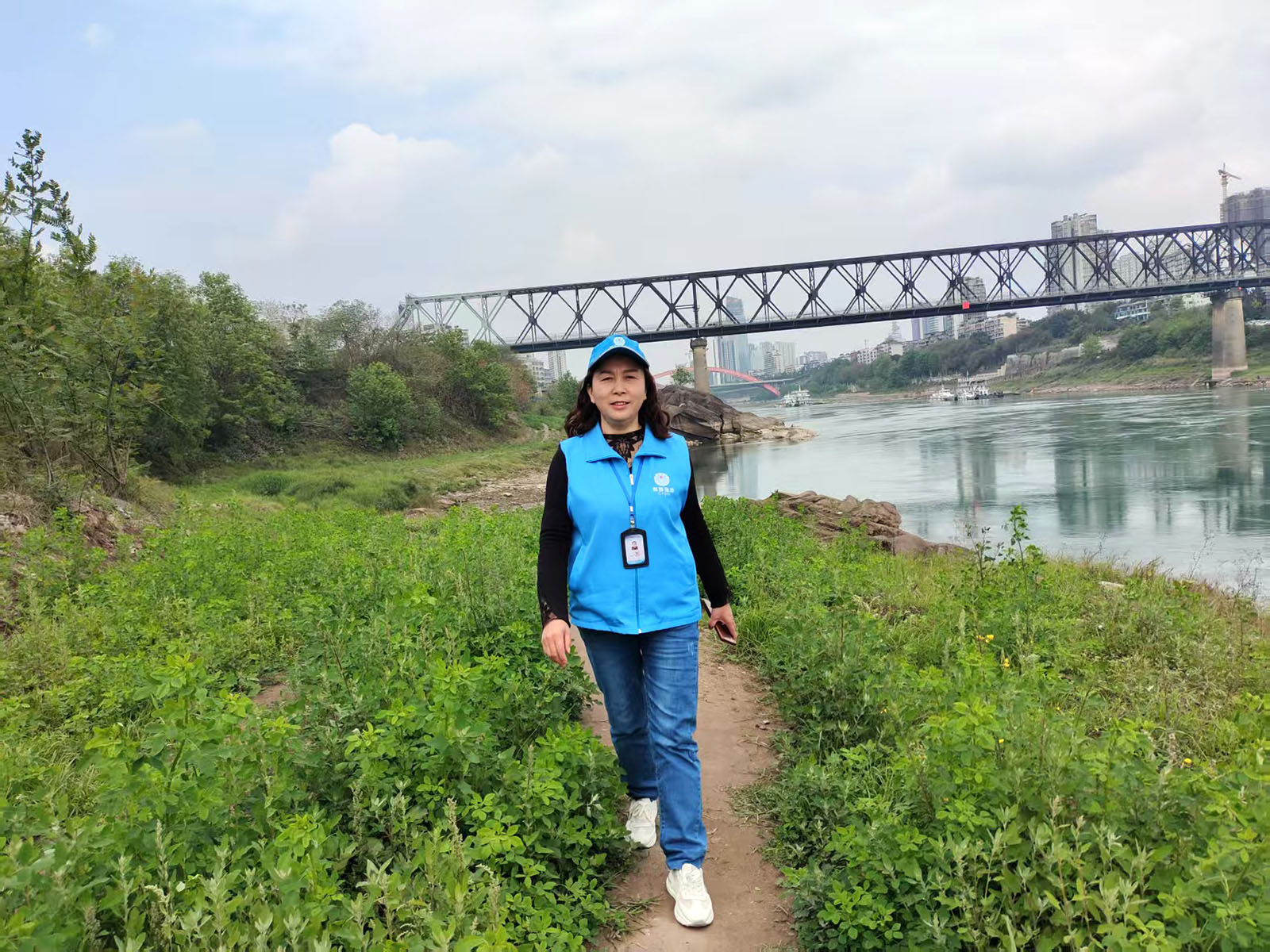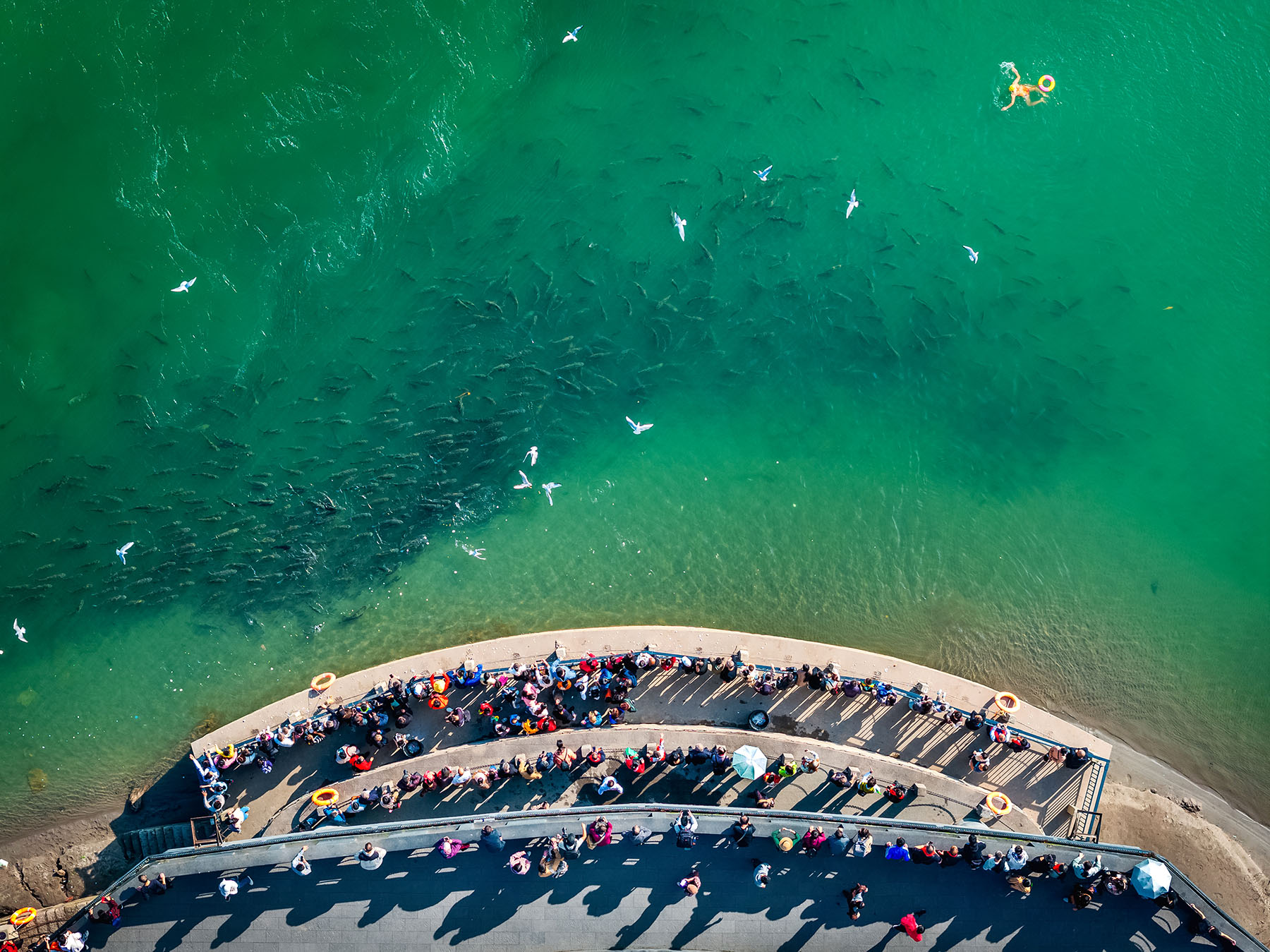Half way into decade-long fishing moratorium, Yibin's ex-anglers witness ecological recovery of Asia's longest waterway

Editor's note: As protection of the planet's flora, fauna and resources becomes increasingly important, China Daily is publishing a series of stories to illustrate the country's commitment to safeguarding the natural world.
Over the past five years, Tang Shengrong has spent almost every day by the Yangtze River. What excites her most is seeing more and bigger fish in its waters.
"Five years ago, you could barely see any fish in the river. Later, groups of small fish appeared. Now, you may come across big ones weighing 35 to 40 kilograms — about this long," she said, stretching her arms wide to demonstrate.
Tang, 53, is an assistant patroller in the city of Yibin on the upper reaches of the Yangtze in Southwest China's Sichuan province. Born into a fishing family, she became a fisherwoman at 19, until a national fishing ban came into effect on Asia's longest river in 2020.
In January that year, China began a decade-long fishing moratorium in 332 conservation areas along the 6,300-kilometer Yangtze. Starting on Jan 1 the following year, the ban was expanded to the entirety of the river's main channel and key tributaries, as well as to large lakes in the Yangtze River Basin such as Poyang and Dongting.
READ MORE: Conservation efforts help revitalize Yangtze
The ban aims to help the river recover from dwindling aquatic resources and degraded biodiversity due to years of overfishing.
Yibin, located around 200 km south of Chengdu and 200 km southwest of Chongqing, is known as the "first city along the Yangtze", as the river's two major tributaries — the Jinsha River and the Minjiang River — come together in the city's downtown area to form Changjiang, or Yangtze as it is known in English.
As of July 2020, all 1,186 fishers in Yibin had packed away their rods and nets.
To facilitate their transition to new livelihoods, the local government offered them compensation packages, along with free entrepreneurship and employment training and subsidized startup loans.

Dramatic return
The transition wasn't easy.
"My husband and I felt completely lost for a period of time," Tang said. "Having fished for decades, what else could we possibly do?"
Her husband had the hardest time adjusting to life without fishing. "He would endlessly pace around the living room," Tang recalled. "He told me it was unbearable for him to be idle at home."
A few months later, on hearing that the local fisheries administration was recruiting former fishers as assistant patrollers, she breathed a sigh of relief.
"The Yangtze raised me, and now it's time for me to do something for it," she said.
After passing tests for physical fitness, swimming skills and literacy, Tang and three family members — her husband, younger brother and his wife — became members of the local fishery patrol team.
Their mission involves daily patrols along the river to curb illegal fishing, sewage discharge, littering and other activities that could harm the aquatic ecosystem.
Tang starts work at 8 am and finishes at 6 pm, though the schedule was often adjusted in the early days.
"When the fishing ban first started, many people still snuck out to fish — usually under the cover of darkness," Tang said, adding that leaders from the local agriculture and rural affairs bureau and the fisheries administration would often take her and her team on night patrols.
"Those illegal fishers fled like rabbits, but they couldn't escape our watch," she said. "After all, we were fishers ourselves, and we know every fishing spot on this river."
Tough as the work could be at times, Tang believes every effort has been worth it.
To her relief, local residents have become increasingly aware of ecological protection. Illegal fishing, sewage discharge or litter are now rarely seen during her patrol.
Hejiangmen, one of Tang's patrol sites where the Jinsha and Minjiang rivers converge to form the Yangtze, has become a popular tourist spot as large schools of wild fish are usually visible there.
"Many beautiful waterbirds have come. Some weren't even seen here when I was young," she said.

Inevitable choice
Liang Duogang, 47, another former fisher who became an assistant patroller in Yibin's Xuzhou district, still vividly remembers his first catch in the Yangtze.
It was one night in 1996, a neighbor had taken him net fishing on the river while he was home from work.
"It took me only three hours to earn 300 yuan ($42), far better than any of my odd jobs," Liang said. He decided to buy a boat and start his fishing career.
Over the years, Liang witnessed the gradual decline of fish stocks in the Yangtze.
"In the 1990s, a single net cast could yield over 5 kilograms of fish," he said, adding that he even occasionally caught big fish weighing over 15 kg.
However, after 2010, a whole day's effort might yield only 2.5 to 3 kg.
He noticed that after the year 2000, catches in the Yangtze became fewer and smaller year by year as a growing number of larger fishing boats appeared.
"The Yangtze really needs a good break," he said.
After quitting fishing, Liang signed up to join the patrol team, hoping to do his bit to help the mother river recover.
"A relative of mine once offered me a job paying over 6,000 yuan a month — double my salary as a patroller — but I turned it down," Liang said. "I'd rather be by the river, with the fish. This is where I belong."
Zhao Huanqing, chief economist at Xuzhou's agriculture and rural affairs bureau who oversees the district's fisheries administration, said half of the district's 40 fishery patrol team members are former fishers.
Facing challenges in lengthy patrol routes and staff shortages, the district has installed 47 sets of real-time video monitoring devices along the Yangtze.
"The devices, placed in high-yield fishing spots identified by the former fishers, will trigger alerts automatically at any detected illegal fishing activity," Zhao said.
In Yibin, 75 former fishers have joined 12 fishery patrol teams. With their involvement, the ecological restoration of the stretch of the Yangtze in Yibin has achieved remarkable results.
Monitoring data shows that water quality in the Yibin section of the Yangtze's main channel has consistently remained at Grade II level — the second highest in China's five-tier surface water quality grading system.
According to Yibin's fishery administration, the number of fish species found in the local stretch of the Yangtze has rebounded from 48 in 2019 to 92 last year, with increasingly frequent sightings of endangered species such as the Yangtze sturgeon.

New path
Unlike Tang and Liang, former fisher Wang Mingjun chose an entirely different career path — running a homestay.
The 42-year-old is satisfied with his new profession — he now earns around 120,000 to 130,000 yuan a year, far more than in the past, and with much less effort.
"Life as a fisherman meant working through wind and rain. It was exhausting," Wang said.
In the second half of 2019, when Yibin's Cuiping district took the lead in Sichuan in helping fishers move ashore, he was among the first to quit fishing.
With cash compensation and a subsidized startup loan, Wang transformed his residence in Yongsheng village in Yibin's Lizhuang township into a homestay.
His homestay sits on a small hill 300 meters from the Yangtze, offering sweeping views of the waterway from its courtyard. At the foot of the hill is a road to Lizhuang ancient town, one of Yibin's most popular tourist attractions.
"With the Yangtze put under protection and the nearby Lizhuang ancient town undergoing development, an increasing number of visitors are sure to come," Wang said.
He credits his newfound success in this unfamiliar industry to the free homestay operation and management training provided by the local government.
"I attended a 20-day training program, from guest services to room maintenance and interior decoration, all completely free of charge," he said.
Wang said his homestay typically hosts about two groups of guests a week during off-peak periods. However, as holidays approach, his phone rings off the hook with booking requests.
ALSO READ: Guideline targets health of Yangtze
In Yongsheng village, eight other homestays are currently in operation.
Cuan Zongqiang, Party chief of Lizhuang, said that while enforcing the fishing ban, the town has strengthened riverbank protection and its sewage treatment capacity.
"These efforts created opportunities for former fishers and other local residents to develop tourism-related businesses," he said.
Lizhuang ancient town has seen a sharp rise in visitors in recent years, Cuan said.
Last year, it received nearly 5 million visits, up 50 percent year-on-year, with tourism revenue reaching 400 million yuan.
"Practice has proven that ecological conservation is never a burden, but a new path for economic growth," he said. "This has further strengthened our resolve to protect the Yangtze."
Contact the writer at pengchao@chinadaily.com.cn


